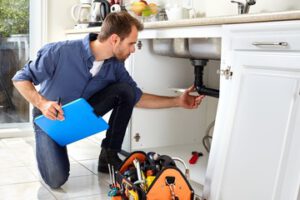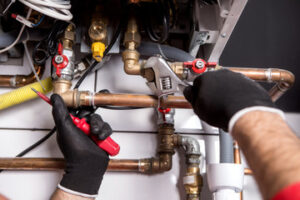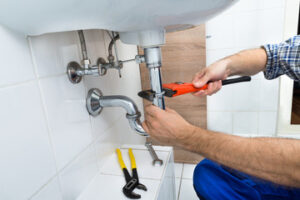Enacted in response to deadly NYC building explosions, Local Law 152 of 2016 requires that all buildings with exposed gas piping have their systems inspected periodically by a certified inspector. A licensed Master Plumber can help you stay compliant by identifying any plumbing issues affecting your ability to pass inspection.
 In 2016, the Department of Buildings (DOB) introduced Local Law 152 which requires that all buildings with exposed gas lines undergo regular inspections to ensure their safety. While it took a few years for the DOB to finalize the details of this law, it is now in full effect with new requirements regarding how often buildings must be inspected, who can perform the inspections, and more.
In 2016, the Department of Buildings (DOB) introduced Local Law 152 which requires that all buildings with exposed gas lines undergo regular inspections to ensure their safety. While it took a few years for the DOB to finalize the details of this law, it is now in full effect with new requirements regarding how often buildings must be inspected, who can perform the inspections, and more.
As of January 1, 2020, all buildings with gas piping except for those in occupancy group R-3 (2 families or less) must be inspected by a licensed master plumber or an individual who has successfully completed the required course of training and is working under the direct supervision of a licensed master plumber. The inspection must include a leak survey of all the gas line system from the point of entry into the building to each tenet space and the meter.
Once an inspector has completed the inspection, they must provide a Gas Piping System Periodic Inspection Report within 30 days and an Inspection Certification within 60 days. If any of the findings are considered to be dangerous, they must also provide the building owner and the utility company with a written notice immediately. This includes but is not limited to: gas leaks; evidence of excessive atmospheric corrosion or piping deterioration; illegal connections; and any conditions that don’t meet codes.
Buildings that stay current with their maintenance typically pass their LL152 inspections without issue. This is because they work with their plumbing and boiler experts to fix small issues before they become larger problems that could affect the entire system.
If an inspector finds anything that needs to be fixed, the building owner has 120 days to remedy the situation and submit another GPS2 with the DOB indicating that the violations have been corrected. If they fail to submit a GPS2 by the deadline, they will be subject to a $10,000 civil penalty.
Even if your building does not have gas piping, it is still important to have a professional inspect the plumbing systems in place. This will allow you to identify any potential ways to improve your systems and help them remain safer for tenants.
If your building falls into the occupancy group R-3, it will not be subject to the inspection requirements of Local Law 152. This category of buildings includes convents and monasteries that have fewer than 20 occupants, along with one and two family homes. Generally speaking, buildings in this group tend to have more permanent residents and less transient tenants than other buildings.
This group also contains adult facilities and child care facilities that provide accommodation for five or fewer adults of any age for less than 24 hours. R-4, on the other hand, covers residential care/assisted living facilities that include more than five but not more than 16 occupants, excluding staff.
As previously mentioned, buildings that are not in the R-1, R-2, R-4 or I occupancies are required to have their gas piping systems inspected by a licensed master plumber (LMP) prior to the first use of the system and then at four-year intervals thereafter. The LMP must submit a GPS2 (Gas Piping System Periodic Inspection Certification) form to the DOB for each of these inspections.
Those that are in the R-3 group, on the other hand, must have their piping inspected in the year immediately following the date of their last LL152 inspection and every four years thereafter. The exact due dates are determined by the LMP’s assessment of the risk of the piping system and the building’s R-3 status.
Buildings that are not in the R-3 group can obtain an extension of their due date if they request it. However, extensions are not guaranteed and may be denied.
In a change from previous rules, the NYC DOB has now organized inspections by community district rather than by borough. This will help ensure that all buildings are able to get an inspection in the required time frame.
It’s a good idea to keep an eye on your DOB’s website for more information about when you are due for your next LL152 inspection and, as always, IAG Energy is here to assist! You can learn more about our services and get help with your LL152 compliance by giving us a call or requesting a quote online.
Conceived in 2016 and put into effect in 2019, Local Law 152 is one of several New York City laws designed to help prevent dangerous gas leaks, fires, explosions and other hazards associated with NYC’s gas lines. The law requires buildings with gas piping to undergo inspections on a regular schedule to make sure the piping is in good working order and does not pose a threat to the health and safety of building occupants, neighbors and city first responders.
The inspections must be conducted by a licensed master plumber, or LMP. A qualified plumbing expert will be able to assess the condition of the gas pipes and identify any hazardous conditions that may require corrective action. Buildings that regularly perform maintenance on their gas piping system typically have no problems passing their Local Law 152 inspections. This is because a plumbing and boiler specialist will be able to catch small issues, like radiator water hammer or low shower pressure, before they have an impact on the overall performance of the system.
If a problem is found during the inspection process, an LMP must file a GPS1 form with the DOB to report the condition. The building owner will then have 120 days to complete the required corrections. If the repairs cannot be completed in time, an extension can be requested from the DOB.
It is important that all documentation pertaining to the inspection and submission of the GPS1 form is kept by the property owner for at least 10 years after the original inspection date. Failure to do so can result in fines of up to $10,000.
A failed Local Law 152 inspection can be caused by a variety of issues, including atmospheric corrosion. This is a common problem for gas pipes that are exposed to moisture, abnormal operating conditions and caustic environments. This can lead to failure of the gas piping components, including joints and seals.
This is why it’s so important that building owners stay current on their maintenance plans and have a reliable, insured and certified plumber handle their periodic LL152 inspections. Tidal Plumbing is a fully licensed and insured NYC Licensed Master Plumber and NYS Backflow Tester. Contact us today to request your LL152 inspection.
LL152 regulations require building owners to have their buildings, houses, and/or structures that contain gas piping inspected periodically by a Licensed Master Plumber. Non-compliance with the law results in penalties of up to $10,000. Fortunately, the DOB allows for due date extensions if you find yourself in a tight spot and cannot meet the deadlines set forth in the law.
To qualify for a 180-day extension, you will need to file the request before your inspection deadline expires and before your Licensed Master Plumber conducts the compliance inspection. Most requests are filed close to the deadline or when it becomes apparent that you will not be able to complete your inspection in time. This is a preemptive application and seeks to forestall an incident like the East Harlem and East Village gas explosions that resulted in 10 deaths and over 80 injuries.
The DOB also requires that you notify your utility and the Licensed Master Plumber of any issues found during the inspection and provide them with the opportunity to correct any unsafe or hazardous conditions. In the event that any conditions are found, you will need to submit a GPS1 inspection report and GPS2 inspection certification within 120 days or face the risk of fines.
As a general rule, the DOB will not allow an extension for more than one year. This is why it is important to contact a Licensed Master Plumber well in advance of your inspection due date so that you can be sure you will have enough time to schedule and perform the inspection.
While the city does keep an inspection calendar online, it can be difficult to find the exact dates that apply to your specific building. The City organizes the inspection timelines by district, which you can check here.
Complying with the requirements of Local Law 152 can be tricky for some property owners, especially those who are not used to managing regulatory compliance in their buildings. But a Licensed Master Plumber who understands the intricacies of the laws and is experienced with performing Local Law 152 inspections can help you stay on top of your compliance, avoid any fines, and make sure that all the gas piping in your building meets local and federal safety standards.

 This means that it is more likely for commercial plumbing to experience issues like leaks and clogs. So what separates commercial plumbers from residential plumbers? Read on
This means that it is more likely for commercial plumbing to experience issues like leaks and clogs. So what separates commercial plumbers from residential plumbers? Read on 